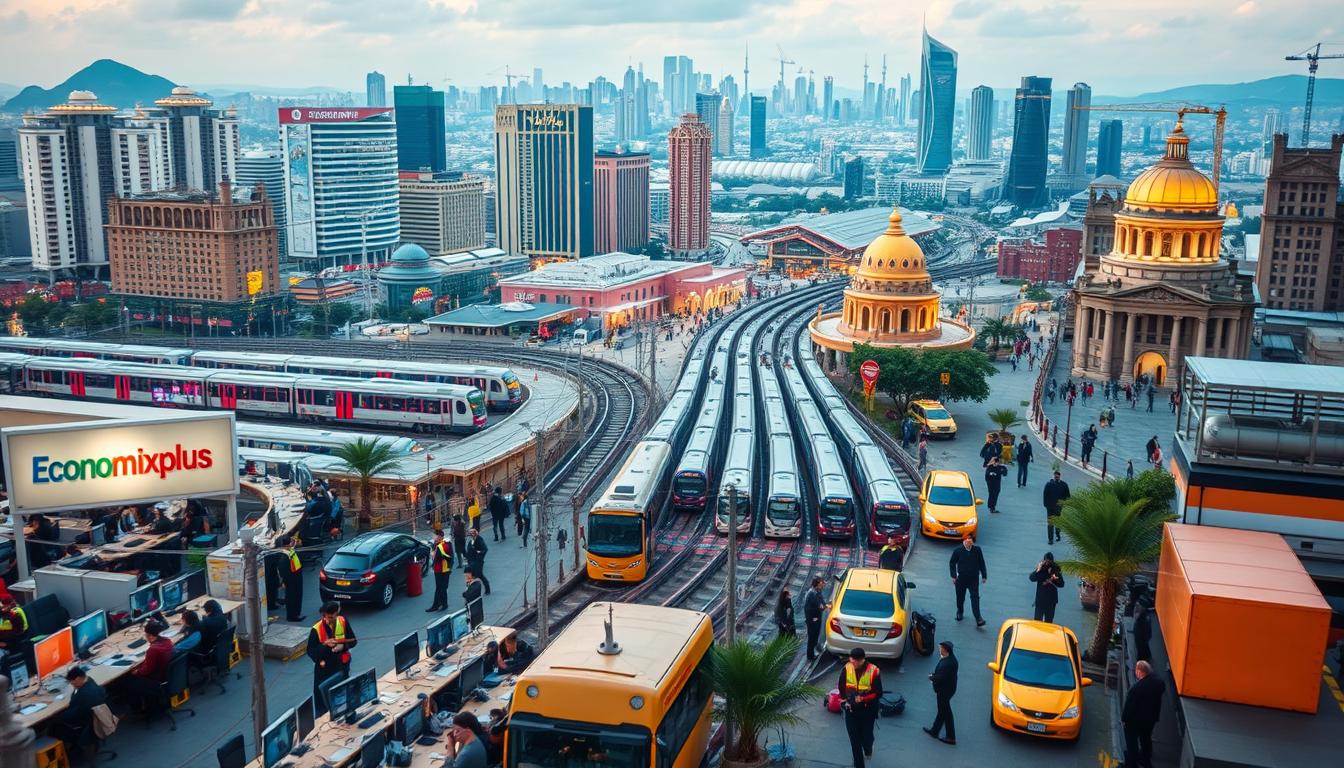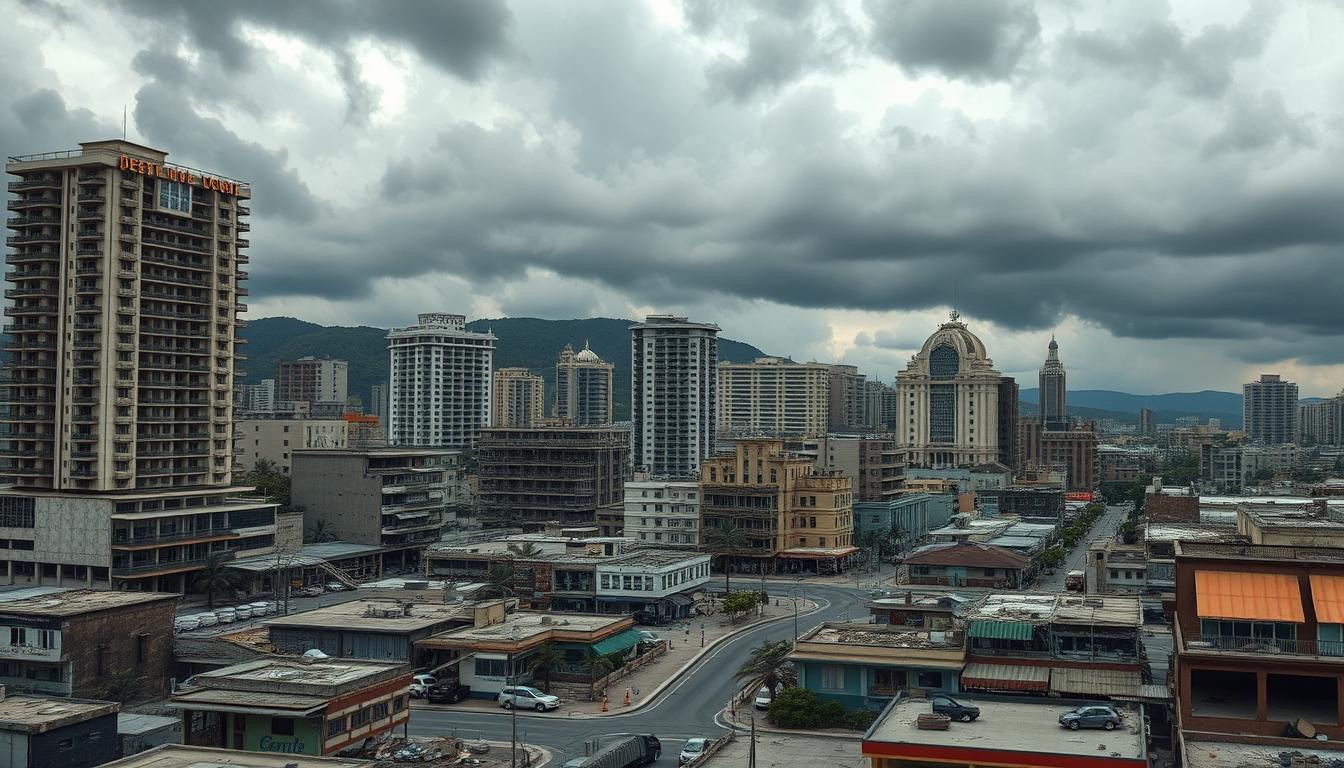Does the world’s fastest-growing economic engine empower workers or perpetuate precarious employment? The travel sector fuels 1 in 10 jobs globally, yet debates rage about whether these roles offer genuine advancement or trap workers in seasonal cycles. With technological shifts reshaping hospitality careers, stakeholders face urgent questions about equity and sustainability.
This industry’s scale is staggering. Linked to the United Nations’ Sustainable Development Goal 8, it drives economic growth while confronting issues like inconsistent hours and limited benefits. Hospitality roles – from hotel staff to tour guides – often serve as entry points into the workforce but face criticism for unstable conditions.
New automation tools and gig platforms add complexity. While digital innovations create fresh revenue streams, they also risk widening gaps between corporate profits and frontline worker earnings. Policymakers now grapple with balancing flexibility for employers with protections for temporary staff.
This analysis explores how America’s $2.6 trillion travel economy navigates these tensions. Through wage trends, policy frameworks, and worker testimonials, we examine whether current systems foster upward mobility or systemic vulnerability.
Key Takeaways
- The travel sector supports 10% of global employment, per United Nations data
- Hospitality jobs are central to achieving UN Sustainable Development Goal 8
- Seasonal positions create income streams but often lack long-term stability
- Technology is reshaping hiring practices and job security in the industry
- US-specific policies significantly impact worker experiences nationwide
Industry Overview: The Evolving Landscape of Tourism and Work
The travel industry’s transformation reshapes economies and labor markets globally. Digital platforms and shifting traveler preferences drive unprecedented changes, creating both challenges and prospects for workforce development.

Global Economic Impact
Hospitality and related services contribute $9 trillion annually to the world economy. This substantial figure highlights the sector’s pivotal role in driving economic growth and development across various regions. This sector supports over 330 million positions, representing 10% of global employment. The diverse range of jobs created spans from direct service roles to management positions, reflecting the industry’s complexity and importance.
Regional economies from coastal resorts to urban centers rely heavily on visitor spending to sustain local businesses, which in turn fosters community growth and stability. This influx of tourism revenue not only benefits hotels and restaurants but also supports local artisans, transport services, and retail establishments, creating a robust economic ecosystem.
Sector Contribution to Employment
Every direct role in hotels or attractions generates 1.5 additional jobs in supporting industries, illustrating the multiplier effect that tourism has on the economy. These supporting roles range from those in transportation to retail, highlighting the interconnectedness of various sectors. Entry-level positions often serve as career launchpads, particularly for young professionals and service-oriented workers, providing them with valuable experience and skills that can lead to advancement within the industry.
These foundational roles are crucial as they not only contribute to individual growth but also help sustain the workforce needed to meet the demands of an ever-evolving tourism landscape. Post-pandemic recovery saw 80% of industry jobs return within two years, demonstrating remarkable adaptability and resilience in the face of unprecedented challenges. This swift rebound reflects the sector’s vital role in economic revitalization and its capacity to respond to changing consumer behaviors and safety protocols.
Understanding the Tourism Sector’s Socioeconomic Role
Shared experiences through travel create invisible threads connecting cultures. This industry’s unique capacity to unite diverse populations drives progress beyond economic metrics, shaping social dynamics and policy priorities.

People-to-People Connector
Local festivals welcoming international visitors demonstrate tourism’s power to dissolve cultural barriers. These interactions foster mutual understanding while boosting small businesses. UNESCO-designated heritage sites often see increased community pride as residents share traditions with global audiences.
Initiatives like the UNWTO’s Tourism for Rural Development program showcase how homestays and craft workshops empower marginalized groups. Such projects reduce urban migration pressures by creating viable livelihoods in remote areas.
Sustainable Development Alignment
Over 80 countries now link travel policies directly to SDG targets. Workforce training programs in Costa Rica and Jordan address skills gaps while improving service quality. However, seasonal demand fluctuations still create instability for many workers.
Key challenges persist:
- Underfunded vocational education systems
- Mismatch between staff qualifications and employer needs
- Inconsistent enforcement of labor standards
Global partnerships aim to balance economic growth with fair practices. The ILO’s Decent Work Agenda guides nations in upgrading hospitality sector regulations, proving collaboration can drive meaningful change.
Employment Trends in Tourism and Hospitality
The ripple effect of hospitality roles extends far beyond hotel lobbies and airport terminals. Every position in this sector activates a chain reaction, supporting roles in agriculture, transportation, and retail. Research confirms that one core industry job generates 1.5 additional positions elsewhere, amplifying local economic vitality.

Job Creation and Multiplier Effect
This employment multiplier transforms communities. A single resort hiring 100 staff indirectly sustains 150 more workers – from food suppliers to taxi drivers. Coastal towns and urban hubs alike benefit, with visitor spending circulating through regional businesses. Recent analyses, such as those examining how economic returns vary by type of, highlight these interconnected growth patterns.
Employment Shifts in the Post-Crisis Era
Post-pandemic recovery reshaped workforce dynamics. Over 80% of sector jobs rebounded within two years, yet roles evolved significantly. Temporary positions now account for 34% of hires industry-wide, up from 22% pre-crisis. Businesses increasingly blend full-time and part-time staff to manage seasonal demand spikes.
Digital platforms enable more flexible scheduling, but concerns persist about income stability. Workers report averaging 12% fewer guaranteed hours compared to 2019 levels. These shifts require adaptive policies to protect employee rights while maintaining operational agility.
Tourism and Temporary Work: Opportunity or Exploitation?
The global travel industry’s reliance on short-term employment models sparks intense debate about worker empowerment versus systemic risks. While seasonal roles provide critical income streams, structural challenges threaten long-term stability for millions.

Balancing Benefits and Vulnerabilities
Frontline staff in resorts and attractions often face unpredictable schedules. Contracts averaging 4-6 months leave limited access to healthcare or retirement plans. A 2023 ILO report revealed 62% of hospitality workers in Spain’s coastal regions cycle through 3+ employers annually.
Successful models demonstrate alternatives. New Zealand’s mandatory 30-hour weekly minimum for seasonal roles reduced turnover by 18% in two years. UNWTO guidelines now advocate similar frameworks to protect staff while maintaining operational flexibility.
Contrasts emerge when comparing regions. Southeast Asian nations report higher satisfaction among cultural tour guides with profit-sharing agreements. Conversely, Caribbean cruise ship employees frequently cite wage deductions for housing as a key stressor.
Innovative policy solutions gain traction. Portugal’s “Green Season Worker Fund” subsidizes training during off-peak months, creating pathways to full-time roles. Such initiatives highlight how strategic investments can transform transient jobs into career launchpads.
Working Conditions and Labor Challenges in the Sector
Frontline staff in hospitality and travel face daily hurdles that test their resilience. From last-minute schedule changes to contracts offering minimal protections, many struggle to secure stable livelihoods while delivering quality service.

Irregular Hours and Temporary Contracts
Over 72% of U.S. hospitality workers report unpredictable weekly schedules. A housekeeper in Las Vegas described juggling three part-time roles: “They cut hours without warning. One week I get 35 hours, the next just 12.” Seasonal positions often lack benefits, with 58% of ski resort employees lacking health insurance.
Mountain trekking porters in Nepal face similar instability. Many carry 60-pound loads for $8 daily – 30% below the national minimum wage. Temporary contracts leave workers vulnerable during off-seasons, forcing some into debt cycles.
Worker Exploitation and Legal Standards
Florida hotel chains paid $3.2 million in back wages last year after violating overtime laws. Such cases highlight systemic issues: 1 in 4 hospitality staff report unpaid overtime or tip theft. Legal protections remain fragmented, with 19 states lacking mandatory break laws for adult workers.
Enforcement gaps enable exploitation. A 2023 study found only 12% of labor violations in the sector result in penalties. Advocates urge standardized federal regulations, like California’s Fair Workweek Ordinance, which reduced last-minute shift changes by 41% since 2020.
Improved oversight could transform conditions. When Hawaii mandated injury coverage for luau performers, workplace safety complaints dropped by 28% in six months. These examples prove targeted policies protect workers without stifling industry growth.
The Digital Revolution and the Future of Tourism Jobs
How is digital innovation reshaping career paths in the travel sector? Emerging tools like AI-driven booking systems and virtual reality tours are redefining service delivery while creating new specialized roles. These advancements demand adaptable skill sets, challenging traditional workforce structures.
Emerging Technologies and Their Impact
Platform tourism now accounts for 37% of global travel bookings, according to recent research. Big data analytics help hotels predict occupancy trends with 89% accuracy, optimizing staffing needs. However, roles like chatbot trainers and experience designers require coding literacy and cultural competency – skills many current workers lack.
| Traditional Role | Tech-Driven Skill Needs | Impact on Sector |
|---|---|---|
| Front Desk Clerk | AI System Management | 24/7 Operational Efficiency |
| Travel Agent | Data Interpretation | Personalized Customer Journeys |
| Tour Guide | VR Content Creation | Global Audience Access |
Addressing the Skills Mismatch
The ILO reports a 43% gap between employer needs and worker capabilities in tech-driven markets. Strategic investment in education programs shows potential – Costa Rica’s Digital Hospitality Initiative upskilled 15,000 workers in 18 months. Similar projects in Nevada reduced onboarding time by 30% through VR training modules.
Key recommendations from global studies include:
- Public-private partnerships for vocational training
- Micro-credential systems for emerging tech skills
- Workforce analytics to predict skill demands
Bridging this divide requires sustained research and funding. As automation accelerates, continuous learning becomes essential for maintaining service quality and worker relevance in evolving markets.
MSMEs: Innovation Drivers and Job Creators in Tourism
Small businesses power big changes in how communities engage with travelers. Micro, Small, and Medium Enterprises (MSMEs) account for 80% of global tourism hospitality businesses, injecting localized creativity into guest experiences. These companies often pioneer niche markets – think vegan-focused bed-and-breakfasts or AI-guided heritage walks.
In accommodation and services, MSMEs create 2.3x more jobs per dollar invested than large hotel chains. A 2023 study found 65% of positions in boutique lodges and guided tour companies stem from enterprises with fewer than 50 staff. “Our village homestay network employs 120 locals who once relied on seasonal farming,” notes a Bali-based entrepreneur.
Three critical challenges hinder growth:
- 48% of tourism sector MSMEs report difficulty securing loans under 6% interest
- Complex licensing processes delay market entry by 4-11 months
- 45% of owners cite tech adoption costs as primary barrier
Innovative solutions emerge despite hurdles. Colorado’s Mountain Tech Collective trains rural B&B operators in revenue management software, boosting occupancy rates by 22%. Coastal towns in Maine use cooperative models to share housekeeping staff across multiple small hotels during peak seasons.
Strategic support frameworks prove vital. The WTO’s policymaker guides highlight how streamlined regulations in areas like food safety certifications doubled MSME participation in Cambodia’s culinary tourism sector since 2021.
These enterprises transform economic landscapes while preserving cultural authenticity. Their agility allows rapid adaptation to shifting traveler priorities – a trait increasingly vital in today’s dynamic markets.
Empowering Youth, Women, and Rural Communities Through Tourism
Local economies worldwide increasingly depend on inclusive workforce strategies to drive sustainable growth. The hospitality industry plays a pivotal role in creating pathways for groups often excluded from formal employment structures.
Inclusive Employment Opportunities
Young adults account for 22% of entry-level positions in leisure services across OECD countries. Women fill 54% of roles in cultural heritage sites and eco-lodges, according to recent data. Rural regions benefit most, with 1 in 3 new hospitality jobs created in areas lacking industrial infrastructure.
Vocational programs like Kenya’s “Tourism Skills Passport” train marginalized groups in digital booking systems and sustainable practices. A graduate shared: “This certification helped me become a safari camp manager at 21 – something unimaginable in my village before.”
Challenges and Success Stories
Despite progress, wage gaps persist. Female workers earn 17% less than male counterparts in similar roles globally. Seasonal contracts leave 38% of rural employees without healthcare during off-peak months.
Innovative solutions emerge where policy meets community needs. Guatemala’s Women-Led Tour Cooperatives increased annual earnings by 140% through collective bargaining. Oregon’s coastal towns reduced youth unemployment by 29% by pairing hotel internships with online education credits.
Educational partnerships prove vital. A Thai initiative connecting culinary schools with beach resorts closed skill gaps for 12,000 workers since 2022. Such models demonstrate how targeted investments can transform temporary roles into career springboards while preserving cultural heritage.
Policy Frameworks for Strengthening the Tourism Workforce
Effective workforce development in the travel sector requires coordinated action across multiple stakeholders. Forward-thinking regulations now prioritize skill-building programs while protecting employee rights. Collaboration between governments, educational institutions, and private companies drives systemic improvements in career longevity and service quality.
Innovative Policies for Job Creation
Portugal’s “Skills for Seasons” initiative demonstrates how policy can transform temporary roles. The program funds off-peak training in digital marketing and sustainability practices. Participants gain certifications that qualify them for year-round managerial positions, reducing seasonal unemployment by 24% since 2022.
Key strategies from global research include:
- Tax incentives for businesses offering apprenticeship programs
- Public-private investment in rural hospitality hubs
- Standardized wage agreements across supply chains
Bridging Educational and Skill Gaps
Misalignment between classroom curricula and industry needs remains a critical barrier. Colorado’s Career Pathways Partnership connects high schools with local resorts to co-design training modules. Students earn credits through housekeeping simulations and revenue management workshops.
Technology plays a pivotal role. Virtual reality programs in Nevada hotels reduced onboarding time by 40%, while AI-driven platforms match workers with micro-credentials. As one training director noted: “Continuous learning opportunities keep teams adaptable amid rapid industry changes.”
Updated labor standards further strengthen these efforts. Hawaii’s recent legislation mandates injury coverage for all event staff, addressing longstanding gaps in worker protections. Such measures prove that strategic policy frameworks benefit both employees and employers.
Global Perspectives: Best Practices and International Cooperation
International collaboration reshapes how nations approach workforce development in travel services. Multilateral organizations pioneer frameworks that balance economic growth with fair labor practices, creating blueprints for sustainable progress.
UNWTO, ILO, and Multilateral Initiatives
The World Tourism Organization’s Global Code for Ethics guides 156 member states in protecting seasonal staff. Its partnership with the International Labour Organization has trained 340,000 workers across 48 countries since 2020. “We’re building bridges between policy and practice,” states an ILO representative overseeing Caribbean hospitality projects.
Key programs address critical gaps:
- Skills certification systems recognized across ASEAN nations
- Digital platforms connecting rural artisans with global markets
- Wage transparency agreements in Mediterranean resorts
Case Studies Across Different Regions
Portugal’s Algarve Workforce Pact reduced seasonal worker turnover by 22% through guaranteed hours and housing subsidies. In Vietnam, UN-backed homestay networks increased rural employment by 140% while preserving cultural heritage.
Asian markets demonstrate innovative approaches. South Korea’s Smart Tourism Cities Initiative combines tech training with language support for foreign visitors. Meanwhile, Bali’s seaweed farming cooperatives now integrate guided tours, doubling household incomes for coastal communities.
These efforts reveal how global strategies adapt to local needs. As economies become more interconnected, shared standards in the sector help prevent exploitation while maintaining competitive services. The world’s collective approach to hospitality careers increasingly determines their power to uplift communities.
Ethical Considerations and the Dark Side of Temporary Work
Behind the glossy brochures lies a complex ethical landscape where short-term roles can mask systemic risks. Supply chains spanning multiple countries often obscure accountability, leaving frontline staff vulnerable to unfair treatment.
Preventing Exploitation in the Tourism Supply Chain
A 2023 investigation revealed Spanish hotel chains using subcontractors to bypass minimum wage laws. Workers reported cleaning 30 rooms daily without overtime pay. Similar patterns emerge in Florida, where cruise line caterers faced $2 million in wage theft claims last year.
Three strategies show potential for improvement:
- Third-party audits of staffing agencies and subcontractors
- Mandatory ethics training for procurement teams
- Public dashboards tracking compliance metrics
Certification programs like Travelife demonstrate how transparency creates value. Properties meeting their labor standards see 19% higher employee retention. “When companies invest in fair contracts, everyone benefits,” notes a certified Costa Rican lodge manager.
Education empowers workers to recognize rights violations. Hawaii’s Hospitality Workers Academy reduced reported abuses by 33% through multilingual workshops on contract law. Such initiatives prove ethical practices enhance service quality while protecting human dignity.
Conclusion
The global hospitality landscape operates like precision scales – one side holding economic promise, the other systemic risks. This industry fuels 10% of worldwide employment while contributing $9 trillion annually to the economy. Yet challenges like inconsistent schedules and skills gaps persist across countries.
Data reveals dual realities. Seasonal roles provide critical income for youth and rural populations, yet fluctuating demand strains worker stability. Innovations like Portugal’s training subsidies and Costa Rica’s digital upskilling programs demonstrate how policy can transform temporary positions into career pathways.
Three priorities emerge from global research: standardized labor protections, cross-border education partnerships, and ethical certification systems. The tourism sector’s future hinges on balancing flexibility with fairness – ensuring profits don’t eclipse human dignity.
Lasting progress requires unified action. Governments, employers, and communities must collaborate to upgrade conditions while preserving the cultural richness driving traveler demand. When managed responsibly, this industry remains unmatched in its power to uplift lives and landscapes worldwide.
FAQ
▶
▶
▶
▶
▶
▶
▶
▶














